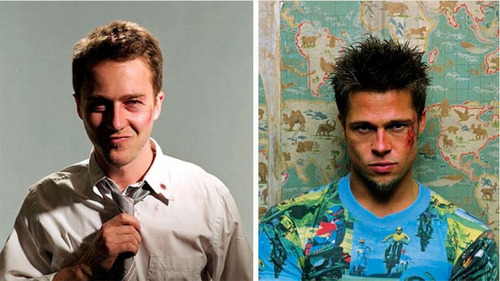Ten years after its release, there are still plenty of people who will not get David Fincher‘s “Fight Club” because they refuse to see what is in front of their eyes. They think it’s about a cult of men who get together to punch each other, which is like saying “Citizen Kane” is about a sled. Fundamentally, it’s an uncannily accurate depiction of depression and delusion — capturing a uniquely (post-?)modern strain of anomie to which perhaps older baby boomers and their seniors find it difficult to connect because it’s beyond their frame of reference. (I don’t know — that’s just a hunch.)
“People get scared, not just of violence and mortality, but viewers are terrified of how they can no longer relate to the evolving culture,” “Fight Club” author Chuck Palahniuk told Dennis Lim recently in the New York Times:
Some older audiences prefer darker material in conventional forms; they “really truly want nothing more than to watch Hilary Swank strive and suffer and eventually die — beaten to a pulp, riddled with cancer, or smashed in a plane crash.”
In that Times piece, Lim dubbed “Fight Club” “the defining cult movie of our time.”
Back in 1999, I described it as “a grim fairy tale for adults, a consumerist revenge fantasy, a portrait of a disintegrating personality, and, for all its hyper-active stylization, an astonishingly vivid portrait of the berserk materialist wasteland in which (like it or not) billions of city dwellers live today.” (It can also be seen, in retrospect, as a prescient 9/11 nightmare.)
Also from Lim’s article:
“The critical reaction was polarized,” said Edward Norton, who plays the film’s nameless narrator, “but the negative half of that was as vituperative as anything I’ve ever been a part of.”
In one of the more apoplectic slams, Rex Reed, writing in The New York Observer, called it “a film without a single redeeming quality, which may have to find its audience in hell.” More than one critic condemned the movie as an incitement to violence; several likened it to fascist propaganda. (“It resurrects the Führer principle,” one British critic declared.) On her talk show an appalled Rosie O'Donnell implored viewers not to see the movie and, for good measure, gave away its big twist.
And director David Fincher picked up on something I noticed when the film was first released: that “women picked up on the humor faster.” Perhaps they understood certain inherent ironies about male behavior (or consumer capitalism?) that were too close to some men for them to see themselves. (Not unlike ”Jack” and Tyler.)
It’s amazing to think that a movie that dive-bombed at the box office, that Hollywood executives found so threatening some considered it unreleasable,¹ that so many critics beat up so viciously (the subject of my article here) could be considered such an important and influential film only ten years later.
My take on the movie is condensed into a few minutes in the above clip. I see it as a classic romantic comedy, a late-20th-century love story in the anarchic spirit of “Bringing Up Baby.”² To quote Lim’s piece again:
Reached by e-mail, [novelist Chuck] Palahniuk went further and called the film “the best date flick ever.” “The ‘Fight Club’ generation is the first generation to whom sex and death seem synonymous,” he said, pointing out that the “meet-cute” between the characters played by Mr. Norton and Helena Bonham Carter occurs in a support group for the terminally ill. Having grown up with an awareness of AIDS, younger readers and viewers, he added, “could identify with the implied marriage of sex and death; and once that fear was acknowledged those people could move forward and risk finding romantic love.”
Or as Norton himself pithily observed in the DVD commentary, it’s the story of a guy who had to destroy the world so he could have a relationship with a woman. Does modern love require anything less?
(Finding and reposting many video essays lost when iKlipz went under. The one above was originally published here.)
* * * *
¹ From producer Art Linson’s book, “What Just Happened?: Bitter Hollywood Tales from the Front Line“:
What I hadn’t anticipated was the dramatic response from those who were uncomfortable with it. They almost wanted to punish those responsible for this “heinous” act. I remember a couple months after the picture was released, I ran into Robbie Friedman, a high-ranking executive at Paramount Pictures, and a friend of mine. All he could do was shake his head.
“How could you,” he asked.
“Huh?”
I was about to start with “Don’t blame us producers, we’re just the monkeys that do th dishes,” or better yet, the more confrontational approach, “You stupid bastard, it’s a brilliant movie and anyways, you must admit it’s darkly funny,” but by that time I’d already been down that road too many times.
² One film ends with the lovers holding hands and the collapse of a dinosaur skeleton, the death of the male protagonist’s past life. The newer film ends with the lovers holding hands and the collapse of skyscraper skeletons, the death of the male protagonist’s past life.
“Fight Club” has just been released in a 10th Anniversary “You Are Not Special” Edition











